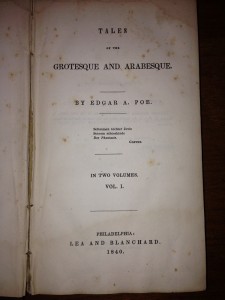Book Title: Tales of the Grotesque and Arabesque by Edgar A. Poe (1839)
I, like many other children in school, was required to read some of Edgar Allan Poe’s work. But why? Indeed, Poe is often (and was often) described by scholars and writers as a man of literary genius (Wagenknecht 6). But, if all it takes is the mark of a literary genius in order to cement oneself within the American education system, why was I not required to read some other author instead? Why read Poe? “Poe was an epileptic. Poe was a manic depressive. Poe was a necrophilliac. Poe was impotent. Poe was syphilitic. And so on, ad infinitum and ad nauseam” (Wagenknecht 13). Although Poe has often been labeled “as a solitary genius unconcerned with cultural contexts” (Faherty 4) due to his “imaginative writings” (Hayes xv), we, as Americans, read Poe because of quite the opposite. Poe was emblematic of American literary, political, and social trends during the 1830s, and this is why we, as Americans, study his work. A closer look into Tales of the Grotesque and Arabesque, a two-volume collection of many of his short stories, provides the reader with such a glimpse into American history.
